Essential Lessons from 2 Weeks of Fast, Intense Russian Learning
Two weeks into Lauren's Russian in 3 Months mission, it’s time for her first update.
She is on a mission to reach a conversational level of Russian by teaching herself, without any formal classes.
In this article she'll share the exact strategies she's been using to fast track her Russian learning over the past 14 days, as well as what’s gone well, and what she could improve on.
First, here’s a short video update so you can see her progress for yourself…
Over to you Lauren!
Crafting a Focused Strategy for Your Language Project
Having a high stakes goal is far from easy. It’s freaking scary!
For me, knowing that I have to reach B1 in 3 months – or come as close as I possibly can – has been really intimidating.
When you’re starting out it feels like an impossible task. It’s a lot of pressure.
I’ve gotten around this feeling by breaking up my “big goal” into small goals (or mini-missions) that are much closer to home.
“Little goals” feel more attainable. They remove some of the stress and help you focus on the task at hand.
“Little language goals” feel more attainable. They remove stress and help you focus on the task at hand. Click to Tweet
So my focus these past two weeks, and for all of my first month, is to set my sights entirely on the next level ahead of me, which is level A1.
“A person at A1 level can understand and use familiar everyday expressions and very basic phrases aimed at the satisfaction of needs of a concrete type. Can introduce him/herself and others and can ask and answer questions about personal details such as where he/she lives, people he/she knows and things he/she has. Can interact in a simple way provided the other person talks slowly and clearly and is prepared to help.”
Effectively, this means that I’m putting my 3-month mission out of my head for now, and focusing instead on reaching this short term goal.
I love how the description really breaks it down for me, allowing me to focus on very specific measurable successes. Compared to the big goal of reaching B1, it seems relatively easy.
Specifically, to reach A1, I need to
Learn to use everyday expressions and very basic phrases
Learn to introduce myself
Learn to ask simple questions
Learn to answer simple questions
This is something I know I can do!
And this simple change has made me feel like my life has gone from this…
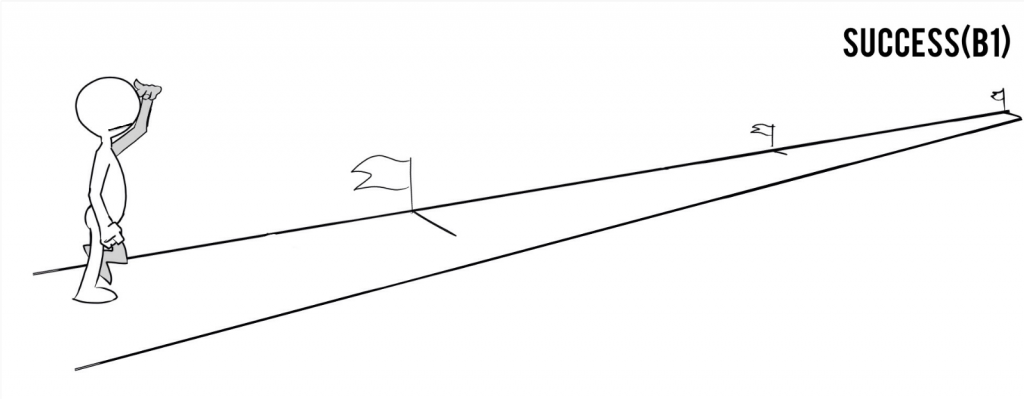
To this:
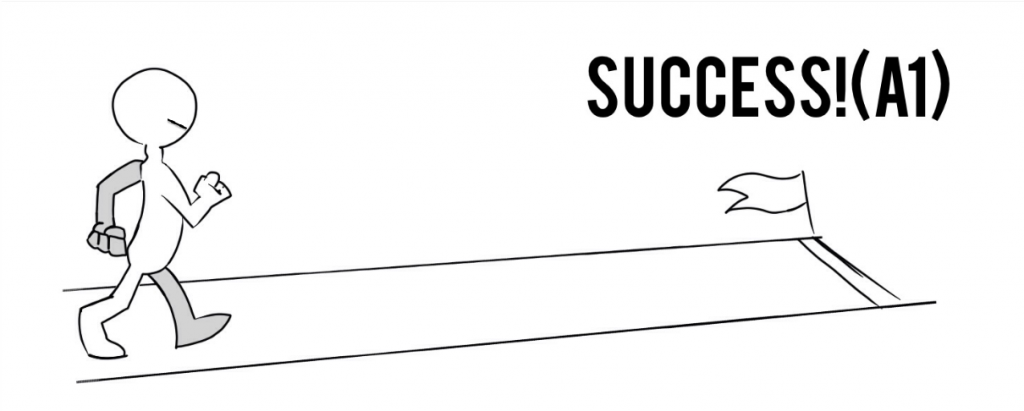
The way I see it, if I can reach this very simple, measurable goal by the end of month one or sooner, I’ll be in great shape and on track.
Week 1: Diving headfirst into an intensive project
A lot of people aren’t really sure where to start in a language project. And I was no different. I knew I wanted to prepare for to have conversations on Skype with my teachers, but I wasn’t sure what was the best way to prepare.
Benny suggested that I just start somewhere, and that from there I’d gain momentum and get a better sense of how I needed to adjust my strategy.
So I started with what I knew, which was RussianPod101. I listened to as many audio lessons as I could, making sure to repeat back the phrases to practice my pronunciation, and most importantly to write down all of the phrases I thought I’d need to use during a Skype chat to refer to later.
While taking the lessons, I made sure to really focus on the words and phrases I needed for my situation, and to ignore the ones that didn’t apply to me. So I skipped over lessons designed for tourists, for example, or that discussed Russian cuisine, because I won’t need to talk about those things any time soon.
Language Tip: I focus on the words and phrases I need for my situation, and ignore the ones that don’t apply to me. Click to Tweet
Taking notes has been a really important part of my process, because it gives me a cheat sheet to rely on while I’m talking on Skype. It also ensures that nothing important that I learn in an audio lesson gets lost.
As I study and learn new phrases, I put everything I learn (that I think I’ll actually use one day soon) into a text document.
As my list grows, I’ve organized the phrases and words into different categories. I’ve created categories that make the most sense to me. By doing this, I have an easy reference so these phrases ready to use during conversations.
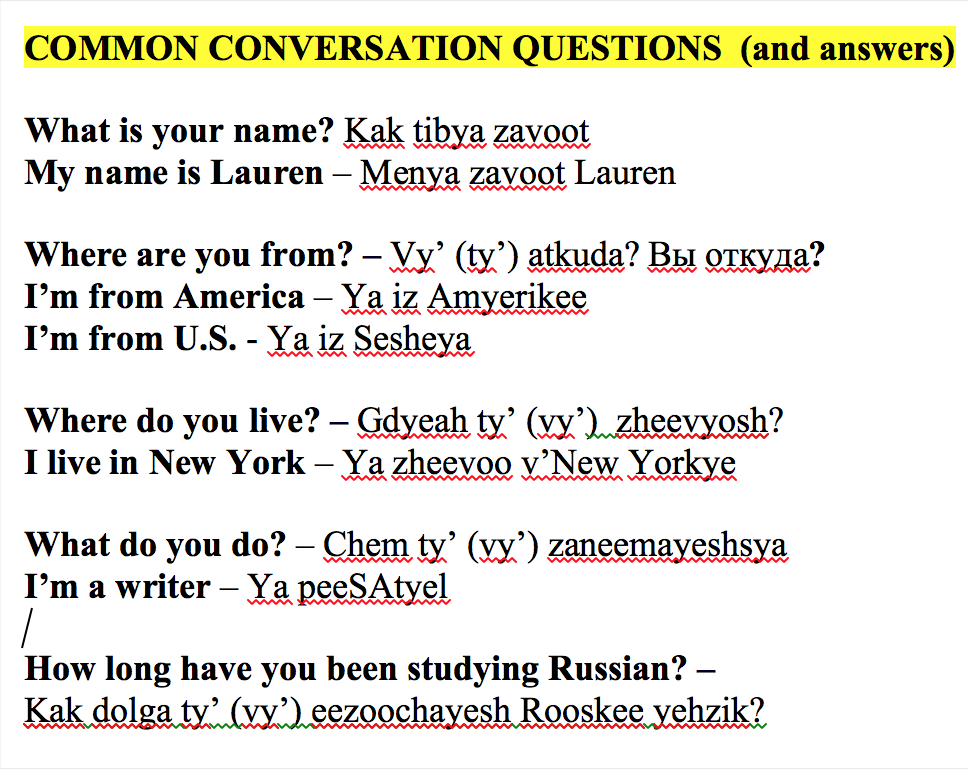
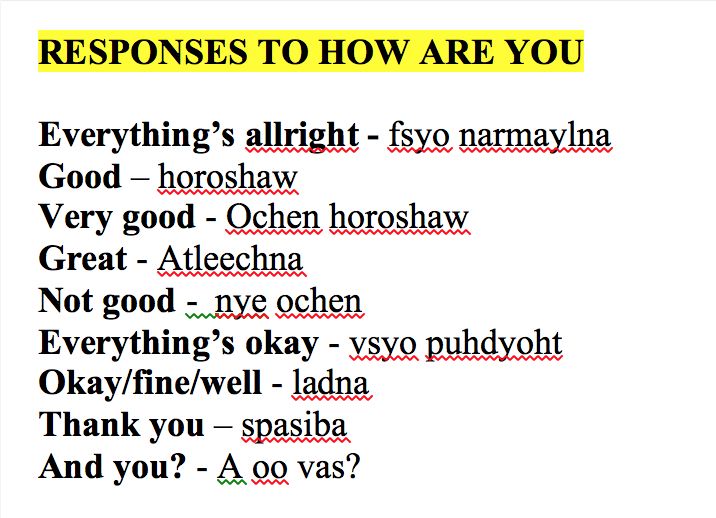
One really fun effect of this is that I’ve become actually really excited to have Skype classes with my teachers so I can practice all the phrases I have on my sheet!
The Bingo Strategy for Fast and Easy Language Learning
When I have Skype calls with my tutors, I play a “bingo” game with myself. I make myself use as many of these phrases as possible. I do this to ensure I’m not using the same phrases all the time, but getting as much breadth as possible. That way, I’ll reach that A1 level more quickly.
This bingo game also helps me to have a really specific purpose in mind before each Skype call: to practice new phrases from my sheet! The more I practice, the easier it becomes to use these words and phrases.
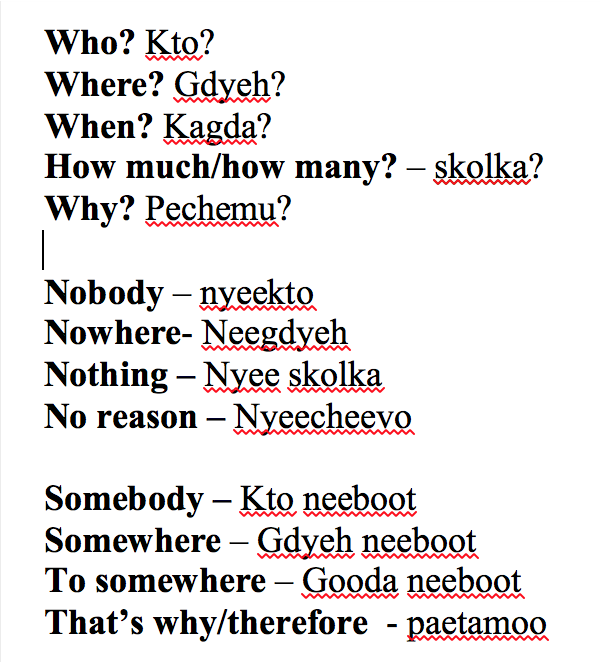
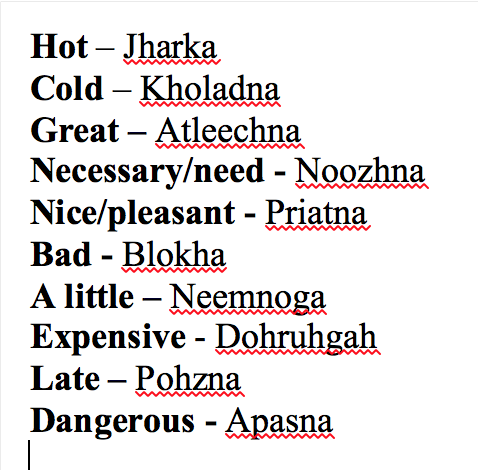
Another unexpected side effect of the bingo strategy is that you’ll start to see patterns and similarities between similar words as you organize them into groups. This will give you a feel for the grammar early on, before you actually start studying grammar formally.
Week 2: Getting into a “Russian Groove” and craving new forms of practice
You’ll see from my notes that I’ve been relying heavily on romanized versions of Russian words. Since I spent so much time listening to my Russian podcast during Week 1, I often took notes quickly, and I jotted down phrases the way they sound to me (phonetically) instead of writing them out in their Cyrillic forms. Typing out Cyrillic is slow work for me.
Although this worked great to begin with, it quickly became a problem. I found myself craving a different sort of practice that would help me get familiar with seeing and reading Russian words instead of just hearing them. This is especially important since my italki teachers do a lot of typing to me in Russian during our sessions.
So, during Week 2 I dove heavily with my Assimil Russian coursebook.
I like studying the Assimil coursebook because it’s a strong way to supplement my audio studies. It introduces entirely new words and phrases that aren’t covered in RussianPod, and I’ve found that I understand word order and grammar differences much better by seeing them written out than I do from just hearing them.
That said, I have found Assimil a bit too technical for my tastes. For example, it contains a lot of explanations like this:
”In this construction, the verb is in the third person plural, and the personal pronoun is in the accusative case. Russian has six cases. Each case reflects a different function of the word in the sentence. The accusative case is the case of the direct object.”
Thanks, Assimil, but that doesn’t exactly clear things up.
To me, this is proof that different courses are just better suited for different people. I have some friends who would really appreciate this sort of technical explanation. I’m just not one of them. I’d prefer a book that used phrases like “I-form” “you-form” and “we-form” instead of “first person singular”, “second person singular”, and “first person plural”.
Even so, I can’t deny that the course has done wonders for me in helping me absorb some light grammar without me even trying. I’m planning to keep it in my routine, but I will be in search of different written courses more suited to my tastes in the coming weeks. Any suggestions would be greatly appreciated!
What’s Working So Far in Learning Russian Fast, And What’s Not
Early on, you’ll need to ditch the roman crutch
Because I’ve been building my “cheat sheet” with my own phonetic romanized spellings, those wrong versions of the words are the ones I see in my minds eye when I’m speaking in Russian. That’s a no-no. Next week, I’m going to comb through my cheat sheet and replace all the romanized spellings with proper Cyrillic.
It will take a while to train my fingers to type Cyrillic quickly, but I’ll just have to suck it up until I’ve gotten used to it.
Skype conversations can make you feel amazing
Honestly, no one could have been more nervous than me the first time I ever spoke a foreign language to another human on Skype. But you know what? I’ve gotten over it, and now I really enjoy it!
I’ve broken my Skype strategy into two parts.
1. With some teachers, all I do is have casual conversations in Russian. How are you? Where are you from? That kind of thing. I call this my “groundhog day” strategy, and I’ve signed up to have chats with a dozen different teachers so I can have this “first” conversation over and over again until I’ve got it down. In these classes, I speak Russian only.
2. With other teachers, I opt to take more structured lessons. In these classes I speak Rush-lish. I try to stick to Russian whenever possible, but I use these lessons to ask questions about the language in English. These teachers give me homework, test me on learning vocab, and help identify my weak points and give suggestions for how I can improve.
Don’t devote yourself to only one learning method
I strongly, strongly believe that you need to use a variety of methods to learn a language. Attack it from multiple angles. Podcasts are fantastic because you get to hear spoken Russian in full phrases and natural contexts, but you’ll need additional support to familiarize yourself with the written language and to reinforce your learning with exercises.
So don’t opt for monogamy in language learning!
I've already reached a point where I have a comfortable understanding of the way the basic grammar works (verb conjugations and masculine/feminine endings). That’s just from hearing so much spoken Russian that I'm ready to start studying and testing my knowledge of this using other tools.
The Assimil course has helped me a lot with being able to read Russian much faster and to get a better grasp on how Russian word order works. That said, I still feel like I need more opportunities to produce my own Russian phrases and to test my knowledge of very simple grammar. So for the next two weeks, I’ll be testing out different methods that I hope will help me in these areas. I’ll report my findings back to you!
Recap: Here’s Exactly What I’ve Done So Far
RussianPod 101
For listening and pronunciation practice
-Completed all “Newbie Season 1” lessons
-Completed 11/25 lessons on “Top 25 Russian Questions”
(based on their relevance to me)
-Completed 19/26 lessons from “Absolute Beginner Season 1”
Reading and Writing Russian Script
To learn Cyrillic
-Completed the entire book
Italki
For spoken practice with native speakers
-Completed 5 conversations on Skype
Assimil Russian
For exposure to written Russian and light grammar
-Completed 13/100 lessons
Memrise
To help learn new vocab
-Completed 75/543 words in “Beginners Russian” deck
My Own Cheat Sheet
A collection of words and phrases, relevant to me, that I’ve compiled from all the above sources. I use this to help me make sure I’m practicing the things I learn in real spoken conversations. I also use this to keep me on track for my specific target (which right now is A1). Find out how to create your own cheat sheet here.

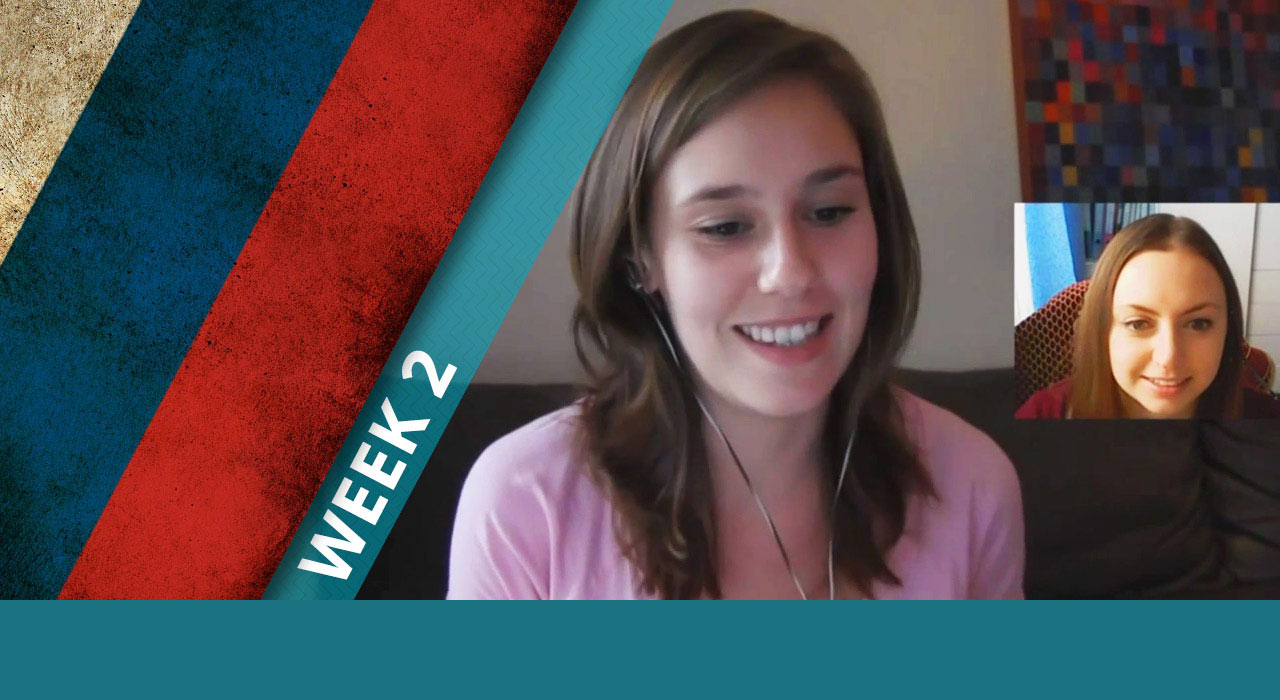

Social